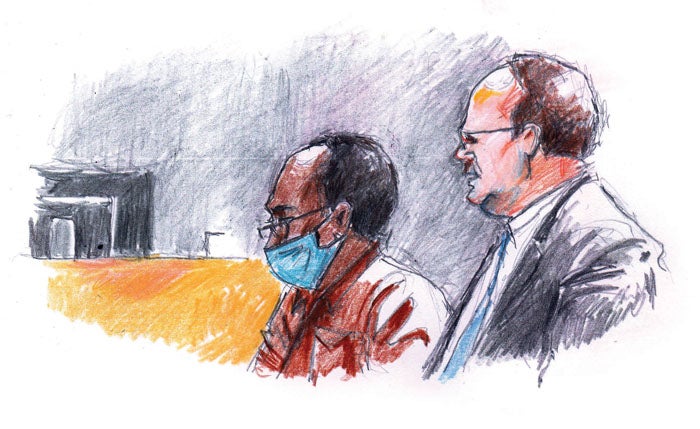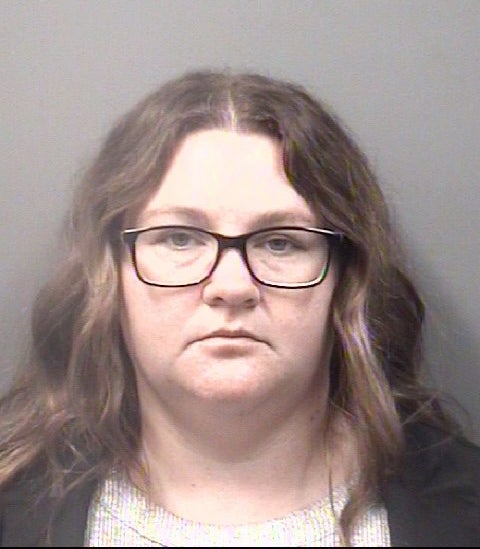‘Somebody who didn’t want to look at what they’d done’: Juan Chunn found guilty of murdering father
Published 12:10 am Wednesday, November 3, 2021

- Murder suspect Juan Chunn, left, and his attorney John Basinger. Artwork by Mark Brincefield, for the Salisbury Post.
SALISBURY — Juan Renardo Chunn was found guilty of first-degree murder in Rowan County Superior Court on Tuesday for bludgeoning his father to death with an oxygen tank.
The 52-year-old was sentenced to life in prison without parole.
“I appreciate the hard work and commitment of Assistant District Attorneys Marsha Goodenow and Brian Taylor in the trial of this case before the jury,” District Attorney Brandy Cook said in a statement. “They worked alongside the Salisbury Police Department to seek justice for Eugene Chunn and his family which was delivered today by the jury’s unanimous verdict.”
The guilty verdict was delivered after the jury deliberated for approximately three hours. The jury reported to Judge Lori Hamilton after just over two hours of debate that it could not reach a unanimous decision. Once Hamilton urged them to come up with a conclusion, and they returned a verdict about 45 minutes later.
The conviction marks the conclusion of a weeklong trial and comes more than three years after Eugene Chunn, 72, was found dead in his residence at 816 E. Franklin St. in the early morning hours of April 19, 2018.
Juan Chunn, who made the call to 911 reporting his father’s death, told authorities at the time that he’d moved in with his father less than two months before in order to take care of him. The story told by the prosecution on Tuesday morning during its closing argument was drastically different.
Goodenow presented jurors with the narrative of a drug-using son who grew so angry with his father’s constant demands and lack of financial support that he committed the “ultimate betrayal” by beating him to death. The murder weapon, Goodenow said, was the very same oxygen tank that Eugene Chunn used to breathe. The bloody tank was stationed upright near Eugene Chunn’s feet when his body was discovered.
Using a simple bullet point-style slideshow, Goodenow gave jurors an exhaustive and impassioned summary of the evidence they presented over the course of the trial. Goodenow told the jury that Juan Chunn had the means, motive and opportunity to commit the brutal crime.
Goodenow said Juan Chunn had the ability to commit the murder because he was the only one who had access to Eugene Chunn’s home, and there were no signs of breaking and entering at the crime scene.
Juan Chunn’s motive for the murder, Goodenow argued, was to steal money from his father, in addition to concerns about being kicked out of the house. Goodenow referenced the testimony of Eugene Chunn’s longtime friend, Kenneth Gibson, who said that Eugene Chunn suspected his son had stolen $400 from him and that he was planning to send his son back to Georgia.
The opportunity for Juan Chunn to carry out the murder was present because he was “in and out” of the house the day after Eugene Chunn was seen alive for the last time, Goodenow said. Juan Chunn told authorities that he’d walked past his father several times that day, even speaking to him, but believed he was asleep under a cover.
Goodenow called Juan Chunn’s statement that he’d thought his dad was sleeping the “most ridiculous story ever told.” Goodenow said she has seen people take better care of a goldfish than Juan Chunn took care of his father.
Goodenow highlighted other pieces of evidence she said indicated Juan Chunn’s guilt, including the fact that there was a cover over Eugene Chunn’s head when his body was found.
“It was an act of somebody who didn’t want to look at what they’d done,” Goodenow said.
Additionally, Goodenow pointed to Juan Chunn’s incessant pleas to retrieve cigars from inside the crime scene as a sign of guilt.
“His father is dead and what he cares about is a smoke,” Goodenow said.
Goodenow concluded her closing argument by replaying both a video and audio clip that had been entered into evidence earlier in the trial.
The video footage was captured by the body camera on the first officer who walked into the crime scene. In the video, the officer says multiple times that it looked like Eugene Chunn had been killed by a gunshot wound. The veteran officer who had been trained to investigate crimes, Goodenow said, misread the injuries at first glance. Goodenow then played a recording of the 911 call made by Juan Chunn to report his father’s death. In the call, Juan Chunn told the operator that his father had been beaten to death. Goodenow questioned how an untrained individual would be able to diagnose the wounds so quickly.
“Who knows it wasn’t a gunshot wound? The killer,” Goodenow said.
In his final argument to jurors, defense attorney John Basinger attempted to discredit the prosecution’s case by telling jurors that they had not been given a witness, nor had they provided DNA or fingerprints that implicated his client as the murderer. The exact time of Eugene Chunn’s death was never determined, Basinger said, so the prosecution couldn’t prove Juan Chunn was there when the murder took place.
Basinger also highlighted the fact that Juan Chunn did not have a speck of blood on his “pristine” white and gray clothing when authorities interviewed him on the night Eugene Chunn’s body was discovered. He also called attention to the details of Juan Chunn’s alibi that had been corroborated by officers, as opposed to the numerous portions that authorities could not verify.
Basinger told jurors that the prosecution wanted them to delve into their imagination and conjure a murder scenario in which Juan Chunn murdered his father, which they are not allowed to do.
Despite Basinger’s effort to exonerate his client, a guilty verdict was read aloud in the courtroom around 4:30 p.m. on Tuesday afternoon.
During sentencing, it was revealed that Juan Chunn had multiple previous convictions in Georgia. Among the past offenses were charges of manslaughter, burglary, possession of cocaine and a hit and run.
Before Juan Chunn was handcuffed and removed from the courtroom, two of Eugene Chunn’s daughters stepped forward to speak.
In addition to giving her own statement, one of the daughters read a letter written by a third daughter. The daughters described their father as a jokester and a good person who only wanted to help Juan Chunn. They said their father was not a drug dealer or drug user, which was alluded to during portions of the trial. Instead, he spent “the last 20 years of his life trying to make sure people stayed away from drugs,” the daughters said.
One daughter said her prayer was that Juan Chunn will acknowledge what he’s done, regret his actions and repent. She went on to say that her father will be missed and appreciated always.




